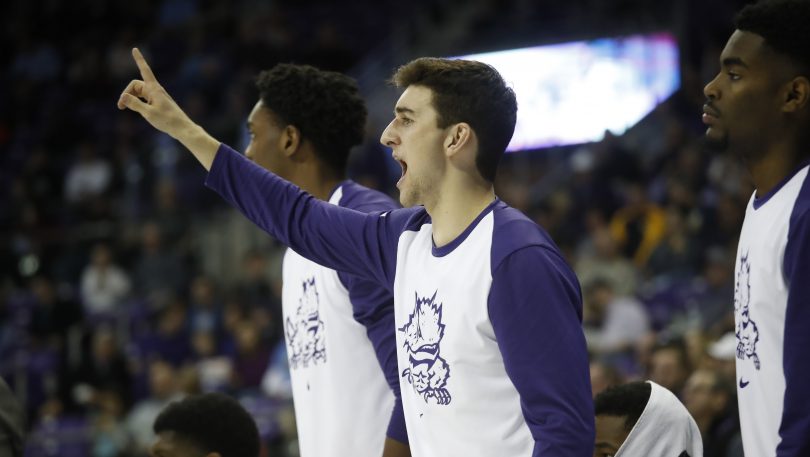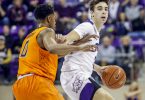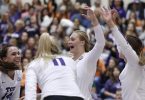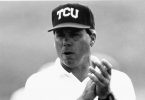FORT WORTH — Most recall with amusement those immortal words uttered so many years ago by the noted philosophe of basketball enlightenment and owner of a killer crossover.
“We sitting in here — I’m supposed to be the franchise player, and we in here talking about practice. I mean, listen: We talking about practice. Not a game. Not a game. Not a game. We talking about practice. Not a game. Not the game that I go out there and die for and play every game like it’s my last. Not the game. We talking about practice, man.”
It went on and on. By the time this lengthy vapid lecture had concluded, Allen Iverson had used the word “practice” 22 times.
His coach, Larry Brown, thought he was drunk. Perhaps he was, though, no one here dare throw stones at glass houses. Day drinking happens, next thing you know your favorite topics are religion, politics, the rules of golf, humans on Antarctica, the history of music, more potent potables … and practice.
Among those who walk about us are a few whose drink of preference is practice.
They are a rare breed.
They love the game of basketball and the concept of team and being part of it that they’ll happily partake in every drill, every sprint, take a charge and the occasional forearm and do all the dirty work of game preparation for nothing.
No books and tuition. No mahogany or tweed. No girls. No glory. Lord no.
They get in a game only when their team is up 25 points with a minute or two left.
Or in leap years, as the saying goes.
Practice is their stage.
TCU released a video earlier this month that darted across social media channels faster than the Road Runner could outwit Wile E. Coyote. Millions have viewed the TCU police officer walking into the Horned Frogs’ locker room in a ruse that ultimately ended with him telling walk-on Owen Aschieris (pronounced uh-share-iz) he was being put on scholarship for this semester.
Aschieris was the beneficiary of a new rule that allows an unused scholarship to be transferred.
In the day or two that followed he was playing – the last five minutes! – against West Virginia in a 30-point game.
“It’s really hard to describe,” Aschieris said. “So much work went into this. It’s been a crazy journey. I called my mom right after [he was put on scholarship], she was at work. She was crying and that made me get choked up, too. It was awesome to be able to tell them that.”
His parents, no doubt, rejoiced with an unforeseen pay raise.
So, too, did the fraternity of walk-ons. This was a victory for the “little guys.”
The walk-on is particularly important to a team that begins losing players to injury or transfer, as TCU has done this year.
They need them … for practice.
When numbers get really low, say, down to eight or nine players, you might get John from the Geology Department running with practice. He’s the geology professor and lunchtime hoop junkie, who is still in shape and can play a little.
That example is a true story, though the Frogs haven’t needed that this year.
The walk-on, coach Jamie Dixon said, will be a win in life, he assured. If you need to hire a good hand, the walk-on is as good as anybody. He provided a list off the top of his head.
The TCU basketball program has produced some good, good people over the years.
And you ask one of them to track down a walk-on, there is no shortage, but rather a smart phone full of numbers.
They’re all still fairly close to their former teammates. Some of that is new or renewed. Since Dixon, a former player at TCU, became coach he has emphasized the history and made the embrace of basketball alumni a focal point.
“I think that typically [the walk-ons are] going to be people who are fairly resilient,” said former walk-on Kurt Wall. “They’re going to have to have a pretty strong work ethic. They’re not doing this because of free college. They’re doing because they want to be part of a team. They want to play that sport.
“If they don’t have the right work ethic or right attitude and don’t have the right level of resilience then, obviously, they’re going to fail. I think typically those are qualities that are going to translate to successful people later in life no matter the career they decide to go into.”
Today a prosecutor in the district attorney’s office in the parish of Livingston in Louisiana, in the days gone by, Wall was a walk-on under Jim Killingsworth from 1985-87.
Wall, a native of Carthage, once had a brush with fame, too. He knew Bernie Tiede, the “inspiration” for Richard Linklater’s dark comedy Bernie, the story of the singing mortician, who was convicted of killing his elderly friend and hiding her body in a freezer.
“He sang at two of my grandparents’ funerals,” said Wall, now 53. “He sure did.”
Not surprisingly, he preferred to talk about his time as a walk-on.
Wall was a Rickel building basketball junkie his first two years at school. Go to class, eat lunch, go play basketball. This schedule is much better than what life after college presents.
As a junior, he decided to try to walk on what turned out to be one of TCU’s best teams ever. His primary responsibility — he and two other walk-ons — was as the scout team in practice. In games, they all rooted like hell for their team.
The 1987 team was the one that lost the infamous game to Notre Dame in the second round of the NCAA Tournament in the final moments. Current TCU coach Jamie Dixon was called for a very controversial block on David Rivers, who hit free throws in the last seconds to win.
It was far worse than the inconvenience of getting up before sunrise.
“Everybody was so down,” Wall said. “Even me, who didn’t even play, knowing it’s the last game you will ever suit up for, that’s all you can think of.”
Stolen is what those guys think about that game, all commiserating with the New Orleans Saints two weekends ago.
Michael Mitchell wanted to play college basketball after graduation from Amarillo Tascosa High School. Temple Junior College was the best offer he got.
“My dream was to play D-I,” Mitchell said. “I sent letters to multiple schools [after junior college]. My sister went to TCU. I said, ‘well, I’ll try there.’ I called Moe Iba. He said, ‘I can’t promise you anything, but c’mon. We’ll try you out.’”
That is the standard line to walk-on hopefuls: “I can’t promise you anything.”
“From Day 1, when school started, I went to all the preseason workouts,” Mitchell said. “We went over to the rec and ran up and down. It was never really, ‘Hey, we decided to keep you. It was more like you’re part of the team unless we decide we don’t want you.
“I wasn’t leaving unless they told me to.”
Mitchell managed to hang around for two seasons, from 1989-91.
As a physics major, Mitchell joked that he was “also the team tutor.”
Today, he works at a U.S. Department of Energy site in Amarillo after getting a master’s in engineering.
Told he was to suit up for the first time, against Tulane, he was so excited that he ran up to the hotel to call his girlfriend with the news. Coaches told him to be back down in 30 minutes to eat.
While he was on the phone, a coach tried to call him to tell him there was a change in plans. Dinner wasn’t in 30 minutes, but rather 15 minutes. All the coach got was a busy signal.
Coaches decided not to let him dress for Tulane after all, when he showed late for the pregame meal.
“Because I’m talking to my damn girlfriend,” he said laughing. “It’s funny how you remember those things 30 years later.”
Kurt Thomas wouldn’t have been treated the same, I can assure you. He might have sat out the tip.
Mitchell said he has “relived” his first bucket, a baseline jumper, a few times since.
Wall recalled the ribbing he received at some Cracker Jack Box gym – he couldn’t remember where — in California. Instead of his contacts, he had to wear “these Kareem Abdul-Jabbar ugly-looking goggles” because of an eye injury he had sustained in practice. Carl Lott had got him in practice.
Ask any walk-on about the first game they got in, they’ll tell you the same thing.
Frightened to death.
Said Wall: “My legs were rubbery.”
Said Mitchell: “Probably the most nervous I’ve ever been.”
It was also one of the best days of their lives, too.
It’s all memorable because being a walk-on was impactful to their lives.
“In a heartbeat,” Wall said, when asked if he would do it all over again. “I wish I had done it the first two years. Everything happens for a reason. Maybe I wasn’t ready to do that.”
That’s what practice means to these guys, Allen Iverson.
Everything.
These are the guys who will do things no one else wants to do simply to stay involved with the game.
“This sounds kind of cheesy,” Mitchell said after seeing the Aschieris video, “but it felt like he was part of the fraternity, the brotherhood, if you will. Even though I had never met him, for a few minutes there was a connection.
“It couldn’t have been at a better place. I love that school.”







